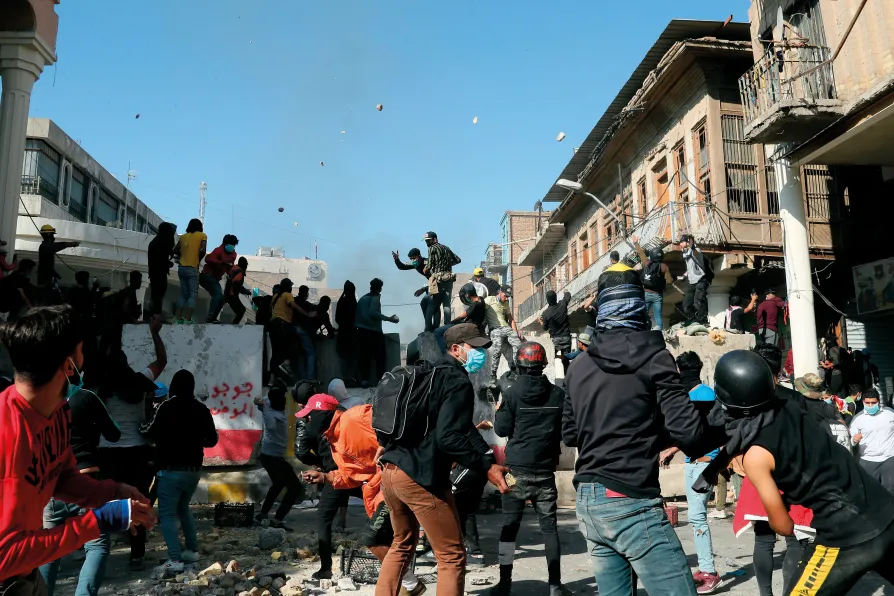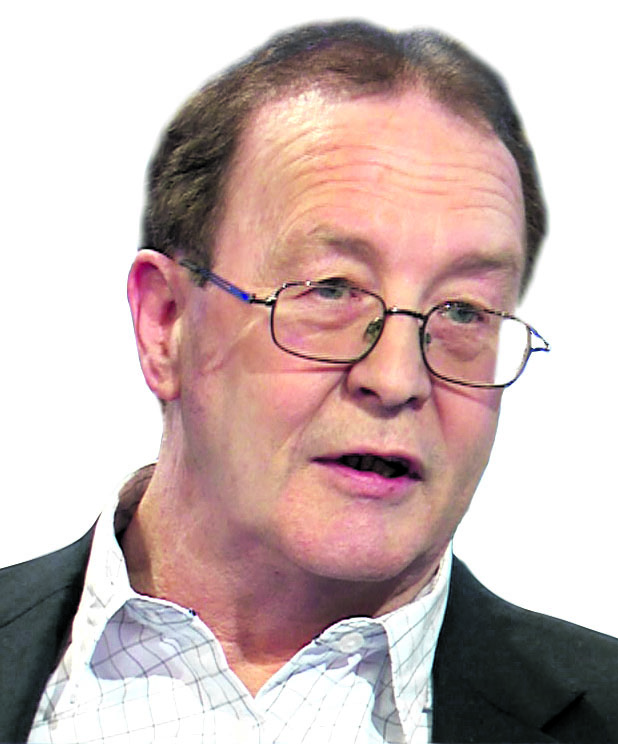Hundreds protested against the US-Israel attacks on Iran in Parliament Square on Saturday, fearing a wider conflagration and horrified by the targeting of young schoolchildren, writes LINDA PENTZ GUNTER
ROBERT GRIFFITHS reports on talks with Raid Jahid Fahmi, general secretary of the Communist Party in Iraq, where sectarian power-sharing makes wielding state apparatus the ‘main domain of conflict’ and the struggling nation’s oil revenues are still held in US banks

 FRACTURED NATION: Anti-government protesters hurl stones during clashes in Baghdad, November 2019, making calls to sweep aside Iraq’s sectarian state system
FRACTURED NATION: Anti-government protesters hurl stones during clashes in Baghdad, November 2019, making calls to sweep aside Iraq’s sectarian state system
RAID JAHID FAHMI has none of the self-important air we expect from long-standing politicians who have held high office.
General secretary of the Iraqi Communist Party (ICP) since 2016, he served as minister of science and technology in the Iraqi government of national unity that rose from the ashes of the US-British invasion and overthrow of the Saddam dictatorship in 2003.
The invasion had been denounced by Fahmi and the ICP, although Saddam’s Ba’athist regime had slaughtered thousands of communists during its bloody reign.
I met comrade Fahmi in the Mandela Room at Ruskin House recently, along with Iraqi CP central committee member Salam Ali and the Communist Party of Britain’s women’s organiser, Carol Stavris, and industrial organiser, Alex Gordon.
Our distinguished guest immediately recognised the name of Idris Cox when I mentioned the former international secretary of the CPGB in the 1950s and ’60s.
Cox had taken a special interest in Iraq, writing articles and pamphlets condemning the terrorist campaign that preceded the Ba’athist coup against the progressive, pro-Soviet regime of Abdul-Karim Qasim in 1963, and defending the government’s nationalisation of the country’s oil industry in 1972.
“Idris Cox and Britain’s communists have a long history of demonstrating their solidarity with the people of Iraq, against dictatorship and British imperialism,” Fahmi remarked. Now that solidarity was desperately needed against genocide in Palestine and the slaughter of innocents in Sudan.
“As for the situation in Iraq, it cannot be separated from the wider and very dangerous context in the Middle East as a whole,” he continued, speaking softly but firmly in one of his several European languages.
“The genocidal war to liquidate the Palestinian people is part of Netanyahu and Trump’s drive to create a Greater Israel, which is an issue for the whole region,” Fahmi declared. Our discussion took place before US President Trump’s October 8 ceasefire deal.
“Like Lebanon and Syria, Iraq is part of the same picture,” he added. “It is important to understand that the US sees Iraq as elsewhere through the lens of Iran.”
US imperialist strategy includes cutting the links between the Iranian regime and its allies: Islamist militias and the governments in Iraq, Lebanon, Syria and Palestine. This would isolate and thus weaken the Islamic fundamentalists in Tehran, assisted by military strikes of the kind authorised by Trump against Iran’s nuclear facilities on June 22.
Iraqi communists and progressives are wary of Tehran’s influence over politicians and militias in Iraq who don’t share the left’s perspectives for strengthening civil government and a civic state.
However, Iran and its allies are still widely perceived as part of the resistance to US and Western imperialism. Hence the strong statement issued by the ICP in solidarity with the Iranian people — note: not the Iranian state power — condemning Trump’s unprovoked, illegal anti-nuclear strikes last June.
Significantly, though, there have been no armed attacks by pro-Iranian militias on US military forces inside Iraq during the US-Iran-Israel conflict. The vulnerable power-sharing coalition in Baghdad needs peace, and the clerical regime in Tehran needs good relations with the Iraqi government.
For its part, backed by the threat of sanctions against Iraq, the US is calling for the mostly pro-Iranian popular mobilisation forces — up to quarter of a million militia members — to be disarmed and disbanded.
Why the systemic vulnerability in Baghdad?
In Fahmi’s view, the sectarian nature of the power-sharing arrangement between majority Shia and minority Sunni factions is the “chief source of Iraq’s weakness today.” A legacy of US occupation, it “makes the state apparatus itself the main domain of conflict,” with rival groups striving to increase their share of power at the expense of others.
Of course, Fahmi points out, “power-sharing is a classic ploy used by imperialism to divide and weaken subject countries and peoples.”
While the 2005 constitution contains some progressive elements, he says, sectarian interpretations of power-sharing have opened up the Iraqi state apparatus to deep-seated internal corruption and to external influences, not only from Iran but also from the US, Turkey and the Arab states.
“The result is instability, a lack of coherent policies and little or no commitment to achieving national objectives on the basis of our national identity,” Fahmi remarks, more in sorrow than in anger.
“These challenges from within and without threaten the identity and unity of Iraq,” he argues, “and present a potentially explosive problem.”
The Iraqi communists respect religious belief but challenge its alignment with political parties. They call on left, progressive and patriotic forces inside the country to fight for far-reaching changes, before very different and reactionary changes are imposed from outside.
Who are the forces capable of changing society fundamentally for the better?
In 2021, the Iraqi CP boycotted parliamentary elections intended to divide, weaken and undermine a popular uprising. A non-sectarian youth movement had emerged across much of Iraq, except in Sunni areas and Iraqi Kurdistan. With its slogan: “We Want a Homeland!” it shook the Shi’ite authorities, who suppressed it with the killing of 800 protesters, compelling Fahmi’s resignation from parliament.
Although the authorities accused the rebellion of being under “external influence,” this was predominantly a home-grown revolt against corruption, unemployment and poor or non-existent public services.
But the young anti-regime forces were and are divided on strategy: should they place the emphasis on mass struggle on the streets or on victories on the electoral front? The ICP proposes both, each reinforcing the other, provided the elections take place when the mass extra-parliamentary movement is on the offensive.
In the run-up to the December 2023 local elections, opposition forces held 350-400 rallies, Fahmi recalls, with the Iraqi communists strengthening their links with numerous groups. Forced to respond, the governing coalition promised to create more than 800,000 jobs for young people — but without any plan to fund them.
We shall see.
Possibilities are further limited by the fact that “Iraqi oil revenues are held in US banks, protected by presidential decree,” Fahmi points out, “and therefore vulnerable to strangulation and collapse.”
As for the pro-Iran, anti-Daesh (Isis) militias nominally under the direction of Iraqi Prime Minister Mohammed Shia’ al-Sudani, the ICP proposes they be integrated into the regular army, itself to be rebuilt and cleansed of corruption.
In the meantime, the ICP and the popular mobilisation forces are preparing for the parliamentary elections on November 11. He has “no illusions” about whether these will be fair, if they are not postponed or cancelled altogether.
There is the possibility of a progressive outcome, but the dangers of abuses of Iraqi state power and outside corruption are very real.
Moreover, Iraq’s current constitution is clear: only non-military parties may contest elections. Yet most progressive and reactionary groups have a military as well as a political front, the ICP leader points out.
Furthermore, three in five Iraqis don’t vote. Many Shi’ites don’t trust the governing parties, but their solidarity with Iran also means they won’t support progressive anti-government forces either. Revolutionary youth believe Foreign Minister Fuad Hussein (in a post allocated to the Kurdish Democratic Party) is an ally in the fight against corruption.
All this puts Prime Minister Sudani in “a contradictory position.” He needs continued US support, and the US need him to remain in office. Victory for progressive or ultra-loyal pro-Iranian forces of any kind would not be welcome.
As for the Iraqi communists, they will be campaigning to end the presence of US, Turkish and all other foreign military forces in their country.
“Whether the US would leave, or simply redeploy its two to three thousand troops to a more friendly environment in Iraqi Kurdistan, we don’t know,” Fahmi remarks.
His party will also be calling for an end to the frequent banning of mass demonstrations, as well as for more investment of oil revenues in job-creating projects, especially for young people.
In response to questions, he praised the vocal participation of women in the protest movement and regretted the religious influence in Iraq’s personal status law, expressing his party’s preference for full and equal rights in civil law instead.
Some women have been barred from standing for election.
“Even so,” Fahmi continued, “women have won advances, for example, against compulsory headscarves in higher education, although curricula include a religious content.”
Returning to the international front, he described the situation in Lebanon as “delicate.” The Beirut government — itself a coalition of different ethnic and religious forces — and the pro-Iranian Hezbollah movement cannot agree on a plan to disarm the latter’s militia and integrate it into the state’s regular armed forces.
“A negotiated settlement is badly needed,” insists the ICP leader, “otherwise Israel could continue to use Hezbollah’s military presence as the pretext for further invasion and occupation.”
There as elsewhere, Middle East communist and workers’ parties remain in contact with one another despite the obstacles.
The Iraqi and Lebanese parties operate openly, and the reunited Jordanian CP is now legal. The Tudeh Party remains illegal in Iran, and the Syrian Unified CP has been banned by the post-Assad transitional government. Communist parties are also active in Kuwait and Bahrain, while the Egyptian CP has influence in the trade unions.
“We still need much more effective co-ordination between communist and workers’ parties internationally,” he concluded, upon which we were all agreed.
Robert Griffiths is general secretary of the Communist Party of Britain.











